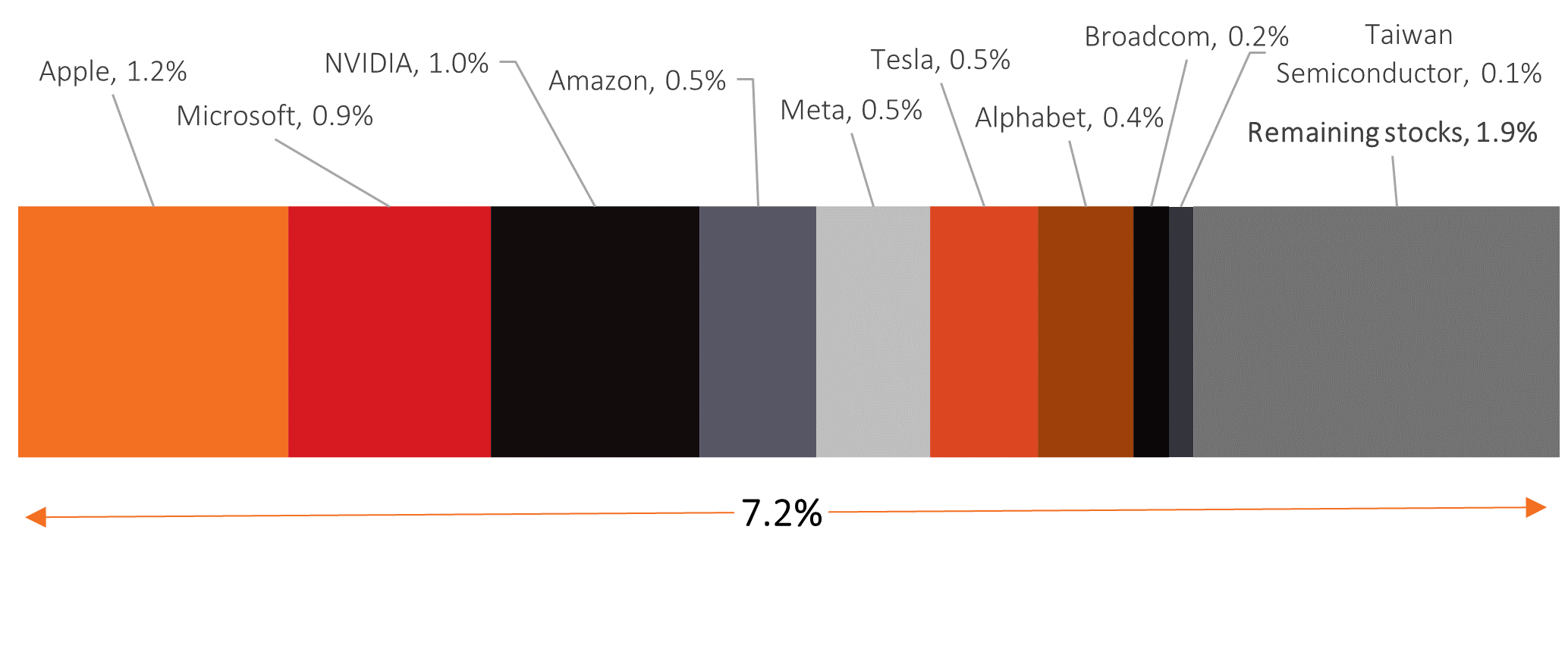Despite the doom and gloom of rising interest rates, elevated inflation, the fear of a wide recession and the continued war in Ukraine, global equity markets[1] (developed and emerging markets combined) have actually risen in 2023. In GBP terms, they have delivered of around 7.2% to the end of June, recovering most of 2022’s fall.
Markets are forward looking and pretty good at reflecting all information publicly available to investors in current stock prices. As is evident from the chart below, the forward looking market view for a very small number of stocks has been extremely positive and this has been reflected in an extraordinary and rapid upsurge in their prices. Some speculate that this may be due to the market pricing in its view on the benefits of the AI revolution for these stocks. In fact just nine companies accounted for three-quarters of the 7.2% rise in global markets this year to the end of June. The remaining stocks in the global markets delivered just a quarter of the total 7.2% rise. It is interesting to note that Apple Inc. now has a stock market valuation of over US$3 trillion, which is around two-thirds the size of the entire UK stock market.
Figure 1: The contribution to the global equity market return of 7.2%

Source: Albion Strategic Consulting (see footnote 1)
The important thing to note is that no-one knew that the rapid rises in these companies’ stock prices were going to happen in advance. Similarly, no-one knows where they go from here. Prices move on the release of new information which is, by definition, random. It may be good news for these companies, or it may not be.
Such concentrated price moves may make some investors wish that they had held more in these stocks, but that is to succumb to the power of perfect hindsight. Others will feel a fear of missing out (FOMO) and dive in hoping that recent past gains continue, succumbing to recency bias. Sensible, evidence-based investors will simply feel glad that they have captured the market returns using the wide net of a well-diversified index fund or similar systematic fund.
Risk warnings
This article is distributed for educational purposes only and should not be considered investment advice or an offer of any security for sale. This article contains the opinions of the author but not necessarily the Firm and does not represent a recommendation of any particular security, strategy, or investment product. Reference to specific products is made only to help make educational points. Information contained herein has been obtained from sources believed to be reliable but is not guaranteed.
Past performance is not indicative of future results and no representation is made that the stated results will be replicated.
![]()
About the author
Albion Strategic
Albion were born in 2001 and initially focused on working with private banks and family offices in the US. In 2006, they began consulting to leading financial planning companies in the UK, many of which have grown into robust, successful and respected firms with strong regional brands.
In that same year, Smarter Investing was published and is now in its third edition. Their systematic approach to investing was tested in the Credit Crisis of 2008-9 and survived with honours. The Albion approach has also been shown to be robust in the more positive markets since, capturing the bulk of returns offered by the markets.
Theory, evidence, logic and patience are the key ingredients to investing success.
[1] As evidenced by the returns of Vanguard FTSE Global All Cap Index (£ Acc). Not a recommendation – illustrative purposes only.
